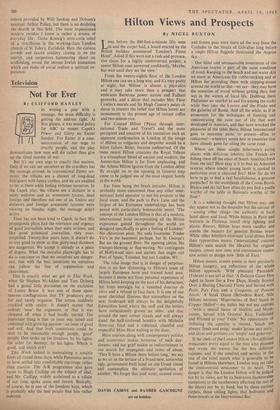Television
Not For Ever
By CLIFFORD HANLEY
IN writing a play with a message, the main difficulty is getting the address right. At first glance, it was sound policy for ABC to mount Capek's Power and Glory on Easter Sunday. For Easter is a com- memoration of our urge to crucify people, and the play
demonstrates how men will die rather than give up the ritual murder of war.
But it's our own urge to crucify that matters. Only if we can see ourselves as the crucifiers has the message arrived. In conventional Easter ser- mons, the villains are a shower of long-dead foreigners with funny clothes, and we are enabled to tut at them while feeling virtuous ourselves. In the Capek play, the villains are a dictator in a nasty uniform and an armament tycoon, dead foreign and therefore not one of us. Unless any dictators and foreign armament tycoons Were viewing on Sunday night, the message didn't arrive.
Time has not been kind to Capek, in fact. His propaganda plays had the relevance and urgency of good journalism when they were written; and like good polemical journalism, they over- simplified. Twenty-five years later, it doesn't do us any good to show us that glory-mad dictators are dangerous. We accept it already as a piece of dogma. What the moralist playwright has to do is convince us that we ourselves are danger- ous; that with the best intentions we ourselves can follow the Line of suppression and chauvinism.
This is exactly what we got in This Week, when Sir Stephen McAdden and Tom Driberg had a genial little discussion on the exclusion of Lenny Bruce. It was one of those spon- taneous conflagrations that TV producers pray for and. rarely organise. The screen suddenly crackled with reality; It doesn't matter that nobody 'won' the argument, or that it was . chopped off when it had hardly started. The important thing is that an issue was raised and contested with growing passion—an issue of good and evil. And that both contestants could be seen to be reasonable enough people, 'good' people. One spoke up for freedom, by his lights; the other for decency, by his lights. Which is good, and which evil?
This Week indeed is maintaining a notable form all round these days, while Panorama seems to have settled into comfortable reportage rather than passion. The A-R programme also gave room to Hugh Cudlipp on the subject of libel, and Mr. Cudlipp, widely acclaimed as a villain of our time, spoke sense and reason. Basically, of course, he is one of the freedom boys, which is probably why the best people find him rather indecent.


































 Previous page
Previous page